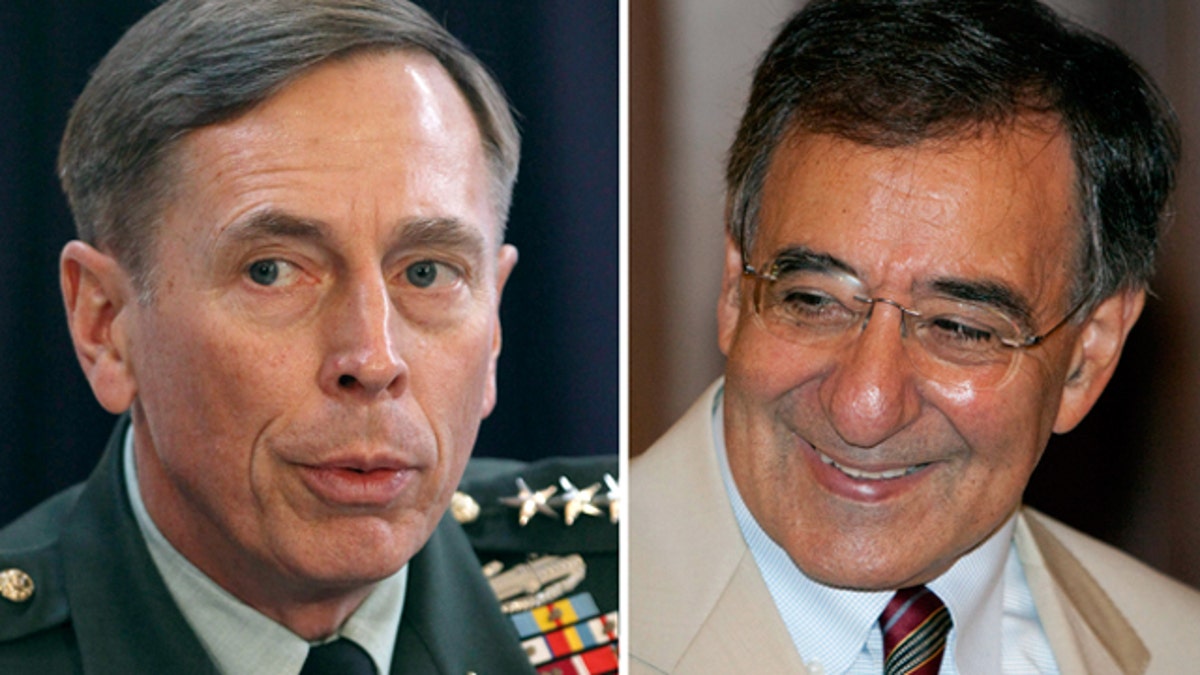
U.S. Army General David Petraeus and CIA director Leon Panetta (Reuters)
WASHINGTON – Navy SEALs carried out what those involved call a textbook military operation that killed the world's most wanted man, Osama bin Laden.
Yet the man in charge was CIA Director Leon Panetta — not Defense Secretary Robert Gates.
That speaks volumes about the government's rarely noticed post-9/11 melding of military might with intelligence craft.
It's gotten a lot harder lately to distinguish between soldier and spy. The blending of the two missions can blur the definition of an act of war, raise questions about oversight and accountability and create a clash of military and intelligence cultures.
In the bin Laden mission, the chain of command extended from Obama to Panetta to Navy Adm. William H. McRaven, himself a SEAL. McRaven is commander of the military's Joint Special Operations Command. That is the secretive outfit in charge of SEAL Team Six and the military's other specialized counterterrorism units.
Panetta's order to McRaven was, "Find Osama bin Laden." And if the al-Qaida leader could not be found at Abbottabad compound, the CIA chief directed, "Get out quickly and safely."
Gates, the second-in-command to President Barack Obama, has made no comment on the raid, though the top-flight SEALs, officially called the Navy Special Warfare Development Group, or DEVGRU, and their parent organization, JSOC, answer to the Pentagon.
Partly, the blur is due to expedience. The CIA already has written presidential authority to spy on hostile countries and allies. It runs its own shadowy commando force and flies its own killer drones, activities that are questionable, if not illegal, under international law.
The military lacks the automatic authority to break those kinds of rules unless, as in this case, its forces are assigned to work temporarily for the CIA.
It is not uncommon for the elite of the elite among the military's special operations forces — top-drawer "special mission units" such as SEAL Team Six and the Army's Delta Force — to be assigned to covert operations under CIA control. But rarely is it acknowledged so publicly as in the case of Monday's helicopter-borne raid on bin Laden's secret lair.
That tradition started under the Bush administration, with the invasion of Afghanistan, and it's likely to continue when the current Afghanistan war commander, Gen. David Petraeus, takes over at the CIA. Petraeus supported a blending of special operations and intelligence that led to a surge in killings and captures of militants in Iraq, helping to turn that campaign around. He's continued that model in Afghanistan, quadrupling the number of special operations forces and nightly raids like the one that killed bin Laden in the process.
Panetta, meanwhile, will take over from Gates as Pentagon boss, now operating on the other side of the same coin.
It may be a tough transition, if the CIA continues to get the top-flight counterterror assignments from the White House.
Panetta has been front and center, doing interviews on "NBC Nightly News" and elsewhere this week, talking about his marching orders from Obama, the prospect of releasing a photo of bin Laden's corpse and other details. Gates, meanwhile, was seen but not heard — visible in official White House photos of Obama and his national security team monitoring Monday's daring raid but mute about mission details.
In the arrangement established by Obama for the bin Laden mission, Panetta was, in essence, the commander rather than Gates, according to a U.S. official who spoke on condition of anonymity in order to discuss sensitive intelligence matters. The legal authority for this is known as Title 50, and although the president can empower the defense secretary to run a Title 50 mission, Gates has preferred that it be done by the CIA, according to special operations officials who have worked on such missions.
The military is capable of leading a counterterror operation like the bin Laden raid, but putting the CIA in charge avoided potential controversy over legal questions.
When he announced Sunday evening in Washington that bin Laden had been killed, Obama spoke about his longer-term approach to eliminating the architect of the Sept. 11, 2001, terror attacks. The president said that shortly after taking office, he directed Panetta to make the killing or capture of bin Laden the top priority of the U.S. war against al-Qaida, along with a broader effort to dismantle bin Laden's network.
Rep. Mike Rogers, R-Mich., chairman of the House Intelligence Committee, said there was good reason to put the CIA in charge. The hunt for bin Laden, Rogers said in an interview, "resembled more an investigation than tracking a target."
The military and the CIA have had close ties since the spy agency's creation in 1947, but the degree of collaboration — and the capabilities of special operations forces — have grown dramatically since 9/11. For example, the military's Special Operations Command has seen its budget more than quadruple — from about $2.3 billion in 2001 to $9.8 billion today. And its manpower has expanded from 45,500 a decade ago to 61,500 today, according to Pentagon figures.
In striving for closer cooperation, the CIA and the military sometimes have butted heads. The CIA, for example, used harsher interrogation methods on captured insurgents in Iraq and Afghanistan than the military believed were useful.
___
Kimberly Dozier can be reached at http://twitter.com/kimberlydozier
Robert Burns can be reached at http://twitter.com/robertburnsAP

